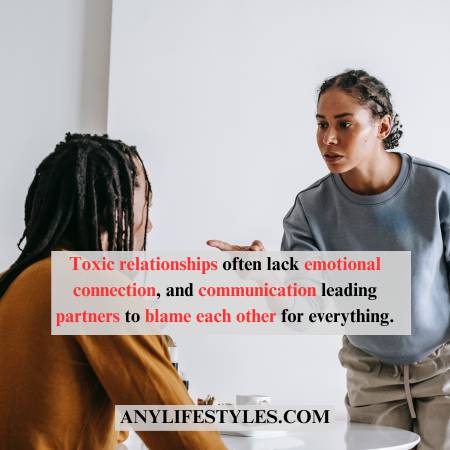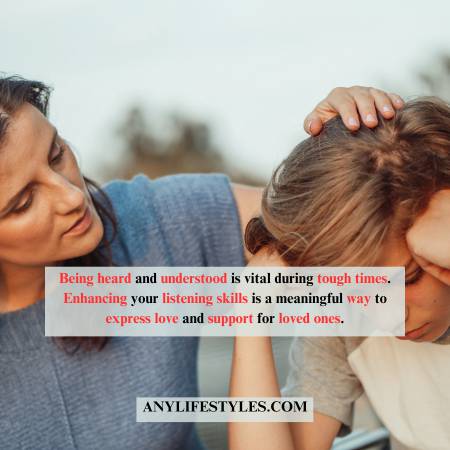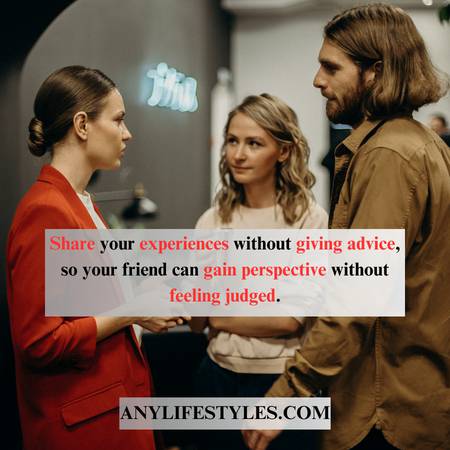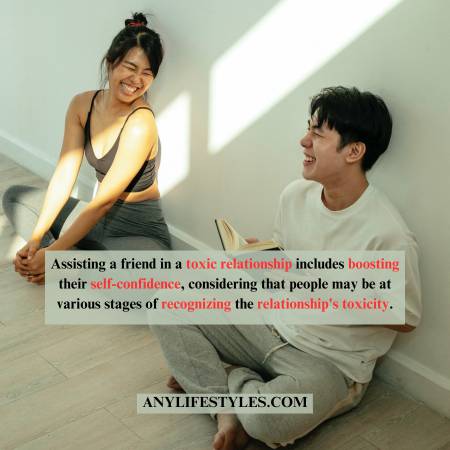When someone you care about is in a toxic relationship, it can be hard to know how to help a friend in a toxic relationship. It’s important to remember that leaving a toxic relationship is a process and your friend may need support along the way.
Toxic relationships can take many forms, from emotional abuse to physical violence. It’s important to recognize the signs of a toxic relationship so you can help your friend. Common signs include controlling behavior, jealousy, manipulation, isolation from friends and family, and physical violence.
If you notice any of these signs in your friend’s relationship, it’s important to approach the situation with care and sensitivity.
In this article, we will explore the delicate art of helping a friend in a toxic relationship, providing valuable insights and practical advice at every step of the way.
What is a Toxic Relationship?
When you are trying to help a friend in a toxic relationship, it’s important to understand what a toxic relationship looks like. In a toxic relationship, one person’s actions can harm the other person emotionally, physically, or mentally.
There are some signs to watch out for toxic relationship when you think your friend might be in one. These signs include your friend being frequently criticized or made fun of, sometimes even about things they can’t change, like their appearance or their friends and family.
In toxic relationships, there’s often a lack of emotional connection, and communication becomes hard. People in these relationships might act mean in subtle ways and tend to blame their partner for all the problems.

They also might not forgive small mistakes and may use hurtful words regularly. Understanding these signs can be the first step in helping your friend get out of a toxic relationship.
The Impact of Toxic Relationships on Mental and Emotional Well-Being
Toxic relationships can be extremely harmful to an individual’s emotional and mental well-being. The harmful dynamics involved in such relationships can cause a person to constantly feel belittled, unappreciated, and even gaslighted.
The continual stress and anxiety associated with these relationships can lead to various mental health problems like depression, anxiety disorders, and post-traumatic stress disorder (PTSD). Furthermore, being in toxic relationships can lead to emotional abuse and manipulation.
This can result in feelings of hopelessness and isolation. Seeking support and extricating oneself from such harmful situations is essential to begin the healing process.
Tips to Help a Friend in a Toxic Relationship
When your closest friend is in a toxic relationship, it can be quite a problem. However, if you’re seeking ways to support a friend in a troubled relationship, there are many helpful actions you can take while avoiding harmful ones.
1. Listen Actively to Your Friend:
Listening to a friend in a toxic relationship requires patience, kindness, and empathy. It’s an act of service and an opportunity to practice qualities like gentleness and self-control. Understanding what your friend is saying and how they feel is vital.
Feeling heard and understood is especially crucial when someone is going through a tough time. Developing your listening skills is a meaningful way to show your love and support for the people in your life.

Improving your ability to listen contributes to your understanding and insight about love. Remember that being a perfect listener is not the goal; it’s about continually working on this skill to better support your friend in their toxic relationship.
2. Don’t Judge or Criticize:
When your friend is navigating a toxic relationship and confides in you, it’s vital to provide a judgment-free and supportive environment. Refrain from passing judging or criticizing their choices, especially when they have chosen to trust you with their concerns.
Instead, encourage them to express their feelings and thoughts openly, allowing them to vent and share whatever is on their mind. You can ask thoughtful questions to better understand their situation, but avoid reacting negatively or trying to control their decisions.
3. Share Your Experiences:
When supporting a friend in a toxic relationship, consider sharing your own past experiences, if the conversation allows for it. This can be a subtle way to help your friend recognize that certain aspects of their relationship may not be normal.
Moreover, it conveys to your friend that you are not judging them for their choices, especially when they realize the toxicity themselves. You can discreetly talk about how you overlooked certain forms of abuse and ignored warning signs before realizing that it’s not your responsibility to fix someone.
Emphasize that relationships should bring peace, love, and joy, not pain. Share your experiences without giving advice, allowing your friend to gain perspective without feeling pressured or judged.

4. Support Your Friend – How to Help a Friend in a Toxic Relationship:
It’s essential to create a safe space where your friend can open up on their terms, without feeling pressured. Understand that discussing their situation might be incredibly challenging for them. Reassure them that they are not alone and that you intend to assist.
You might feel like you are being cautious when talking about tough issues because you are worried it could make things worse. Sometimes, the best way to support your friend is by showing your constant care and understanding.
5. Check-in Them:
To help a friend in a toxic relationship, it’s important to regularly ask them how they are truly feeling, as advised by Carlyle Jansen. When you check in, make sure you listen without passing judgment on their emotions or reactions.
If they become defensive, it’s a natural response in this situation, and you shouldn’t push them further. According to Jansen, defensiveness indicates they might not be ready to discuss it yet.
Let your friends know they can talk to you. It may take time, so be patient. Keep checking in and showing support.
6. Be Present For Them:
To support a friend in a toxic relationship, it’s important to understand that friends and family may initially offer support. But as time goes on, that support may dwindle, while the survivor’s journey can extend for years.
It’s crucial to acknowledge that we all have our limits, and self-care is essential. If you are wondering how to assist a friend trapped in a toxic relationship, being there for them consistently in the long run can be an incredibly meaningful gesture.
7. Build Their Self-Confidence:
Helping a friend in a toxic relationship often involves nurturing their self-confidence. It’s crucial to recognize that individuals may be at different stages of acknowledging the nature of their relationship.

You can begin by assuring your friends that you are there for them and that your support is genuine. Rather than repeatedly questioning why they are enduring this situation, focus on consistently uplifting their self-esteem.
Instead of framing conversations negatively, emphasize how wonderful they are as a person. By taking this positive approach, you might provide them with the strength they need to navigate their situation.
8. Respect Their Boundaries:
Respecting your friend’s boundaries is vital when assisting them in a toxic relationship. If your friend desires to discuss their situation, offer a non-judgmental ear. However, if they opt not to talk about it, honor their wishes without prying further.
Emphasize the importance of respecting your friend’s boundaries. Avoid attempting to persuade them to leave the relationship. Instead, offer unwavering support and be available when they need it, all while remaining mindful of your boundaries to protect your mental well-being.
9. Don’t Give Advice – How to Help a Friend in a Toxic Relationship:
Offering unsolicited advice to a friend in a toxic relationship can do more harm than good. It places a burden on them for several reasons. To avoid putting them in this dilemma, it’s best to refrain from offering advices unless they specifically seek your guidance.
You can inquire about their coping mechanisms, such as asking, “How are you handling this? Do you think someone could assist you in managing it better?” Unwanted advice can make them feel even more guilty, even when they aren’t at fault.
Remember that your friend should be the one to decide what’s best for themselves. Until then, simply being there for them is often the most valuable support you can provide.

Conclusion – How to Help a Friend in a Toxic Relationship
In concluding thoughts on how to help a friend in a toxic relationship, it’s crucial not to pressure them into sharing their situation with you. Instead, respect their pace and let them initiate any conversations. Be sure to make yourself available when they feel the need to discuss something important.
You can gently encourage them to consider professional help, but if they are hesitant, continue to offer kindness and love until they are ready, even if it takes time. If you ever need further guidance on helping a friend in such a situation, please don’t hesitate to reach out to professional help.
However, should the situation escalate to a point where their safety is at risk, don’t hesitate to seek outside assistance. Your friend’s well-being should always be the top priority.










